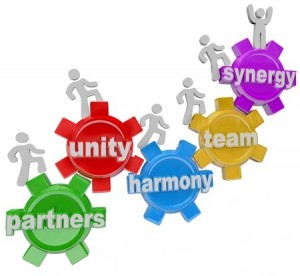By Rose O. Sherman, EdD, RN, FAAN
“Remember teamwork begins by building trust. And the only way to do that is to overcome our need for invulnerability.” Patrick Lencioni
Casey Stengel, the beloved manager of many major league baseball teams, once noted that “Finding good players is easy. Getting them to play as a team is another story”. The same could be said of teams in health care settings. Guiding team members to get past their day to day problems, conflicts and communication issues toward a goal of working as a high performance work team is a significant leadership challenge. Nowhere are the stakes higher than in the health care, where team synergy and interdependence are required for high quality patient outcomes.
Key Ingredients for Effective Teamwork
If you have worked on a highly effective and smooth running team, it is an experience you are not likely to forget. Effective teams have the following 10 key characteristics:
- Clear Goals that everyone on the team works towards
- Clarity about the role and contributions of each team member
- Open and clear communication
- Effective decision making
- Engaged team members in the work of the team
- Appreciation of diversity – generational, cultural and diversity in thinking
- Effective management of conflicts
- Trust among team members
- Cooperative relationships
- Participative leadership
Why Things Go Wrong On Teams
Communication breakdowns and conflict are inevitable on teams. If managed effectively, they can be viewed as an opportunity for team growth but often, this does not occur. The most common behaviors that create obstacles to effective team work include blaming others, turf protection, mistrust and an inability to directly confront issues. In the absence of complete trust, people are more likely to withhold their ideas, observations and questions. Professionals are also more likely to leave teams with trust issues. It is not surprising that in our health care system, ineffective teamwork is now recognized as a potential patient safety issue. Trust begins with communication. Teams must be taught that relationships live within the context of conversations that teams have, or don’t have with one another. When open and frank communication is not present, things can and do go wrong on teams.
Team Building
High performance work teams in any setting rarely occur naturally. They must be created and managed. Leaders play a key role in helping a team to develop the ability to collaborate effectively, build relationships and trust, innovate and achieve results at a consistently high level. It all begins with setting the stage for quality communication among team members.
Attention must be paid to establishing venues in which these conversations can take place whether they occur in team briefings, meetings or at social events. There needs to be a zone of safety created at meetings where team members can constructively challenge current processes, procedures or how the team is functioning. Team ground rules are critical to developing strong relationships and trust. Understanding that team members are expected to respect one another, listen to each other, care for each other, accept responsibility for their behavior and learn from each other helps to foster a sense of commitment. A good exercise for leaders to use with teams is to ask team members to assess how well the team is doing. Members can be asked to rate how true statements such as the following are for their team:
- The goals of our team are clearly stated and known by members.
- The members of our team are committed to accomplishing our shared team goals.
- Our team accomplishes its goals.
- The talents of each of our team members are fully utilized.
- Each member of the team fulfills the role he or she is expected to play.
- Our team deals with conflict in an effective manner.
The collective answers to a team assessment can be a powerful way to introduce team building initiatives that build on a team’s strengths and addresses weaknesses. Team building is journey that never ends. As new members join the team, they need to be encouraged to participate in building the team culture. Current team members may need to be encouraged to be nurturing of novices and see their development as part of a professional legacy. To instill effective teamwork into health care, there needs to be more recognition of its importance. To create high performance work teams, reward and recognition programs need to include awards for team achievement. Team recognition programs help to build team esteem and send a strong message that effective teamwork matters.
Read to Lead
Teamwork – An Inspirational Short Video Click Here
Sherman, R.O. & McClean, G. (2009). Developing a high-performance OR team. OR Nurse 2009, 3(1), 10-12.
© emergingrnleader.com 2014



 LinkedIn
LinkedIn Instagram
Instagram